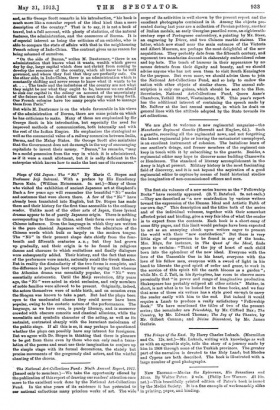Plays of Old Japan : The " No." By Marie
C. Stopes and Professor Joji Sakurai. With a preface by His Excellency Baron Kato. (William Heinemann. as. net.)—Many of those who visited the exhibition of ancient Japanese art at Shepherd's Bush a few years ago will remember the beautiful "No " masks and costumes that were shown there. A few of the "NO" have already been translated into English, but Dr. Stopes has made them and their history for the first time accessible to the ordinary reader. Unlike most of the other arts of Japan, these lyrical dramas appear to be of purely Japanese origin. There is nothing corresponding to them in China, and their form owes nothing to Chinese influence. Even the language in which they are written is the pure classical Japanese without the admixture of the Chinese words which bulk so largely in the modern tongue. The "NO" in their present shape date chiefly from the four- teenth and fifteenth centuries A. D. ; but they had grown up gradually, and their origin is to be found in religious dances and choruses to which recitations and finally dialogues were subsequently added. Their history, and the fact that some of the performers wore masks, naturally recall the Greek theatre. But in reality the dissimilarity of the two forms is complete, and the difference is perhaps best expressed by saying that whereas the Athenian drama was essentially popular, the " NO " were essentially aristocratic. Until the Meiji revolution, fifty years ago, the "NO" were acted in strict seclusion, and only members of noble families were allowed to be present. Originally, indeed, the actors themselves were of noble birth, and on occasion even the Shogun was known to take a part. But had the plays been open to the uneducated classes they could never have been popular, owing to the esoteric nature of the performances. The language, as we have seen, is purely literary, and is moreover crowded with obscure conceits and classical allusions, while the unrealistic and symbolic character of the acting, as well as its restraint, contrasted sharply with the luxuriant melodrama of the public stage. If all this is so, it may perhaps be questioned whether the plays can possibly have any interest for foreigners. But we agree with Dr. Stopes in thinking that there is pleasure to be got from them even by those who can only read a trans- lation of the poems and must use their imagination to conjure up the simple stage with its formal decorations, the stately but precise movements of the gorgeously clad actors, and the wistful chanting of the chorus.


















































 Previous page
Previous page